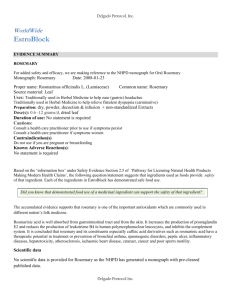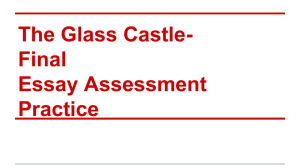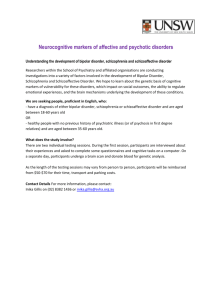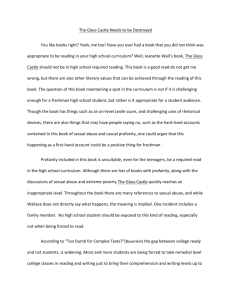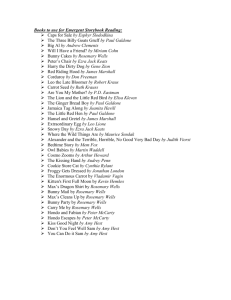File
advertisement
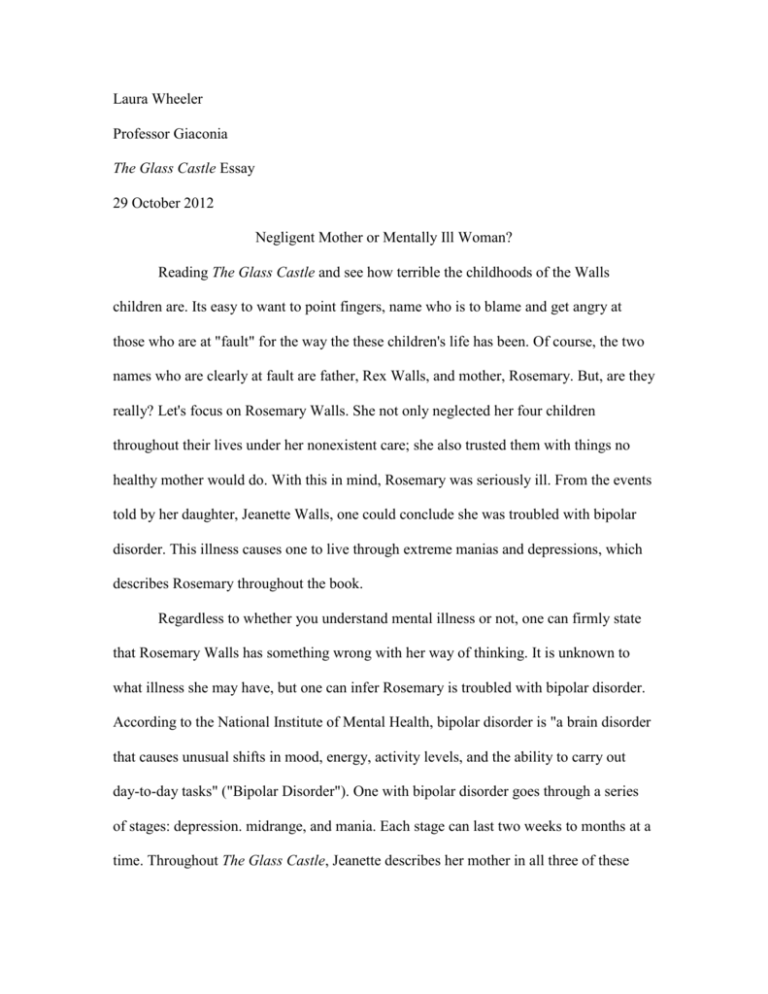
Laura Wheeler Professor Giaconia The Glass Castle Essay 29 October 2012 Negligent Mother or Mentally Ill Woman? Reading The Glass Castle and see how terrible the childhoods of the Walls children are. Its easy to want to point fingers, name who is to blame and get angry at those who are at "fault" for the way the these children's life has been. Of course, the two names who are clearly at fault are father, Rex Walls, and mother, Rosemary. But, are they really? Let's focus on Rosemary Walls. She not only neglected her four children throughout their lives under her nonexistent care; she also trusted them with things no healthy mother would do. With this in mind, Rosemary was seriously ill. From the events told by her daughter, Jeanette Walls, one could conclude she was troubled with bipolar disorder. This illness causes one to live through extreme manias and depressions, which describes Rosemary throughout the book. Regardless to whether you understand mental illness or not, one can firmly state that Rosemary Walls has something wrong with her way of thinking. It is unknown to what illness she may have, but one can infer Rosemary is troubled with bipolar disorder. According to the National Institute of Mental Health, bipolar disorder is "a brain disorder that causes unusual shifts in mood, energy, activity levels, and the ability to carry out day-to-day tasks" ("Bipolar Disorder"). One with bipolar disorder goes through a series of stages: depression. midrange, and mania. Each stage can last two weeks to months at a time. Throughout The Glass Castle, Jeanette describes her mother in all three of these stages many times in the storyline. Rosemary was mainly written about in an wither manic or midrange episode in the book. Some characteristics of a manic episode are extreme irritability, talking fast, jumping from one idea to another having unrealistic beliefs of their own, or another's, abilities, and taking part in pleasurable behaviors, just to name a few ("Bipolar disorder"). Jeanette writes about how her mother lets her cook hotdogs at the tender age of three (The Glass Castle, 9) and at the age of six, was given her newborn baby sister to hold on the long drive home from the hospital (The Glass Castle, 46). Mothers should trust their children, but Rosemary trusts her child too much; she has unrealistic beliefs of her young children's abilities. In the first case, Jeanette gets sent to the hospital for six weeks from cooking all alone (The Glass Castle, 11). Jeanette describes her mother's moods as: "She'd be happy for days on end, announcing that she decided to think only positive thoughts" She goes on to say "But the positive thoughts would give way to negative thoughts...when that happened, Mom would refuse to get out of bed... she would lay wrapped up in blankets on the sofa bed, sobbing about how much she hated her life" (The Glass Castle, 207). Common symptoms of a depressive episode of bipolar disorder are feeling worried and empty, loss of interest in any and all activities, irritability, and feeling tired ("Bipolar Disorder"). With this said, when things "just got to [Rosemary]," she would retreat to her bed and stay there for days on end, :crying and occasionally throwing things at us. She could have been a famous artist by now, she yelled, if she hadn't had children, and none of [the children] appreciated her sacrifice" (The Glass Castle, 187). For Rosemary, her depression landed her on the couch, crying, physically unable to tend to the needs of her children. These symptoms are tough, if not impossible, to overcome when severe enough. Another scary act associated with people affected by bipolar disorder is suicide. "The mood disorders (depression and bipolar mania- depression) are by far the most common psychiatric conditions associated with suicide. 25% to 50% of patients affected with bipolar disorder attempt suicide at least once (Jamison?). In the book, Jeanette writes about an instance where it looks either to be Rosemary is attempting to kill herself or Rex is trying to throw her off the second story of their house (The Glass Castle, 71). It is never fully revealed which one it is. Its Rex's word against Rosemary's to the children. This could be taken as another potential look at explaining Rosemary's probable disorder. Along with the manias and depressions, those affected with bipolar disorder are likely to have obsessive compulsions (Federman). These can be things such as washing your hands from germs more often than necessary to doing an activity over and over without needing breaks. Rosemary has a obsessive hobby she does to escape her own demons, that is painting. She puts her paintings and supplies before the children's wants and needs on more than one occasion. Rosemary was working on a painting a few days after Jeanette get back from the hospital from the burns of cooking hotdogs. Jeanette asked her mother if she would cook her one; Rosemary said no. "'Good for you,' Mom said when she saw [Jeanette] cooking. 'You've got to get right back in the saddle. You can't live in fear of something as basic as fire'" (The Glass Castle, 15). This is a great case in point where Rosemary puts her painting (obsessive hobby), in front of one of her children's needs. No matter where the Walls move to, down the street or across the country, Rosemary always needed her paintings and supplies brought along. This made less room for some of the children's things when packing the car for the Rex Wall famous skedaddle (The Glass Castle, 17). It is very apparent that Rosemary Walls has some type of undiagnosed illness troubling her mind that she does not realize. A close to accurate conclusion is bipolar disorder by looking at the evidence of the symptoms and events described in the book The Glass Castle. Without diagnosis, Rosemary is at risk to herself and those around her. Her children have suffered just as much, if not more, than she has, from her lack of care and affection towards them. Though it would be easy to put all of the blame on Rosemary, it would not be fair and just. Her undiagnosed disorder has influenced her ability to mother her offspring in a nurturing environment young children need.

